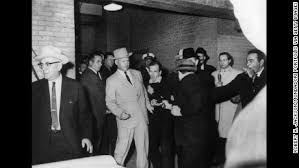November 24, 2020 (Tuesday)
Two days ago, I published a blog about the assassination of President John F. Kennedy in Dallas, Texas in 1963. It was the 57th anniversary of that awful event. I was pastor in Dallas at the time, and so, two days later, on Sunday, November 24, 57 years ago today, I preached to a full house (600 people sitting where 135 usually sat on a regular Sunday) about the tragic death to a stunned congregation, all of us coping with the realization that what seemed to be the tragedy of the century had taken place in our city. I remember my sermon had three points: “1. The President Is Dead,” “2. The United States of America Is Not Dead,” and “3. Let Us Be Comforted by Our Faith,” concluding by resolving, “Let Us Pledge Ourselves To Be Good Citizens of Our Great Nation.”
Then, after the sermon, as usual on Sundays, I stood at the exit to greet the worshipers as they were leaving. When almost everyone had passed by to shake hands with me, a lone young member of the church paused to let me know, “They shot that guy and killed him.” He was speaking of Lee Harvey Oswald, a name not yet familiar to us, who was being moved from the city jail when a local nightclub owner, Jack Ruby, stepped forth from the gathering crowd and shot him. The moment of his being shot was photographed and that day’s edition of the Dallas Times-Herald had a picture of his being shot on the front page, margin to margin.
Looking back to that moment when I was informed of Oswald’s death by gunfire, I remember saying to the young man who told me, “Well, I’m not surprised.” I said that because resentmet of this unknown assassin was in the air of Dallas as the city took the blame for the assassination. A crowd on the street waiting to get a glimpse of the accused assassin cheered when informed of the shooting. Their response was seen by the cameramen of the local television stations and the cheer was beamed around the world.

The prime suspect in the murder of Kennedy was now dead, and there could be no trial for the crime. Public attention then shifted to Jack Ruby, who had killed Oswald. Ruby was tried and found guilty, then sentenced to death in the electric chair. But that sentence was lifted and he was granted another trial in a different city because the court determined that Ruby could never have had a fair trial in Dallas. While awaiting a new trial, Ruby died in prison from lung cancer.
The Warren Commission, appointed by President Lyndon Johnson to study the details of the assassination, concluded that it was the work of one man, Oswald, and no one else had been involved. But conspiracy theories would not fade away, and so a new commission was elected by Congress, and that committee left the door open for conspiracy ideas, but offered no proof; therefore, the questions were unresolved. And so, even today, the theories persist because the public is still interested.
I was living in Dallas, watching Walter Cronkite announce on television that Kennedy had died. He stared into the camera, choked a little, removed his glasses, almost shed tears, replaced his glasses, slightly groped for words, and said to us all, “The president has died…..” A brief silence followed. Then began a long period of bereavement around the world.
